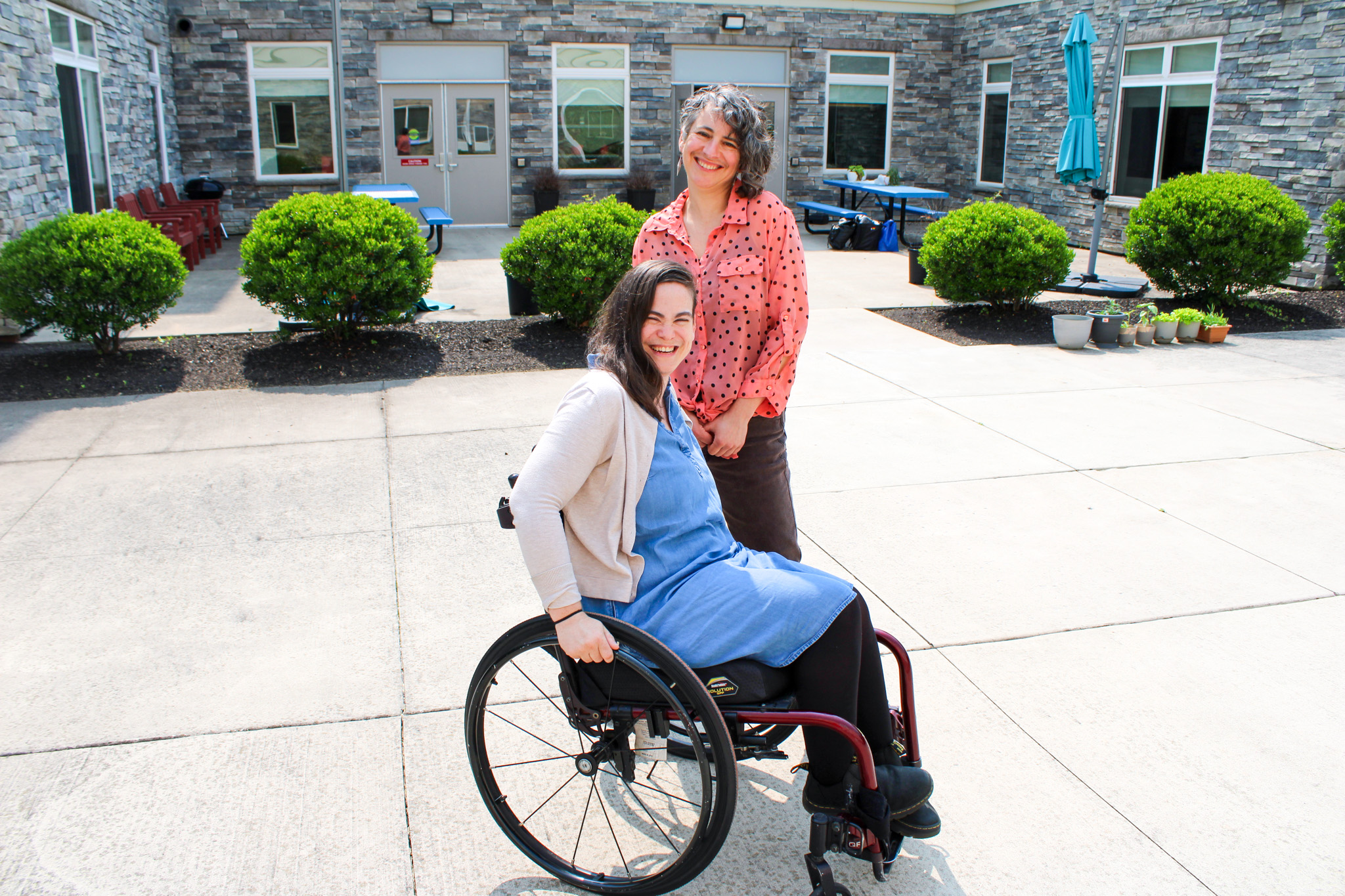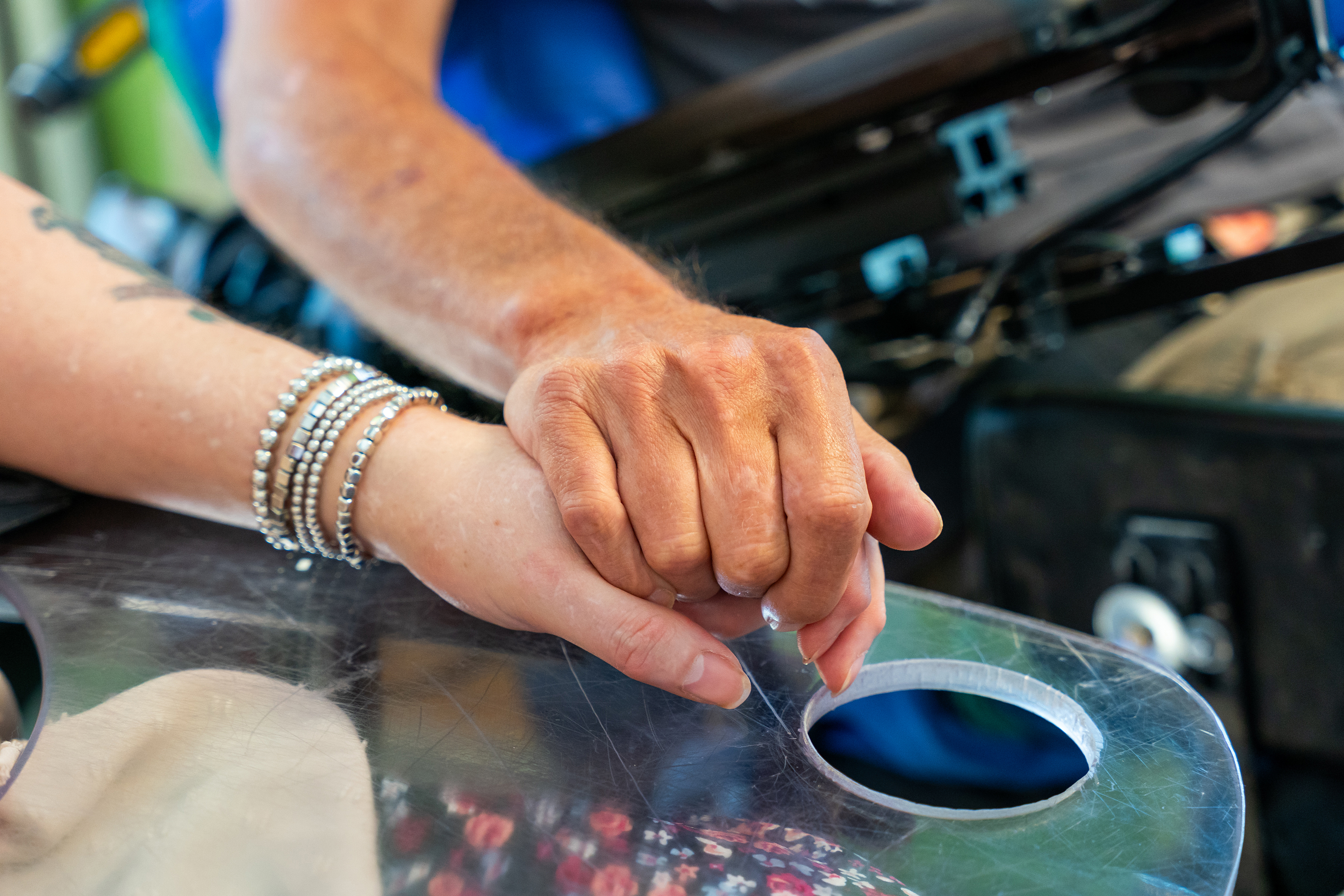August 05, 2025
Disability and Sex: How Temple University’s Institute on Disabilities Is Supporting Residents in Intimacy
By Lauren Tilghman

Experiencing a healthy intimate connection with a romantic partner is something that most adults desire in their relationships. Whether you’re dating, married, or “having fun” —understanding the ins and outs of healthy sexual relationships is important for all of us. Quite often, people with disabilities have been excluded from the collective narrative when it comes to talking about sexual experiences— due to bias, fear of fragility, and just the lack of education. Temple University’s Institute on Disabilities’ (IOD) Healthy Sexuality Project works to keep everyone’s sexual wellbeing—no matter their ability—in consideration and in the conversation, too.
The Healthy Sexuality Project launched over 20 years ago under the leadership of Beverly Frantz to support people with disabilities that had communication accessibility needs—and had experienced sexual harm— navigate the process with the criminal justice system. In 2022 the Program underwent a restructure within IOD’s Health Equity program and expanded its focus to prioritize prevention and holistic sexuality education for people with disabilities, their loved ones, and those that support and care for them.
The Healthy Sexuality Project offers interactive trainings on a one-on-one basis, as well as small and large groups settings—on a variety of topics including how to build healthy relationships; consent, boundaries, and communication; understanding the basics of positive sexual health; intimacy, self-expression, types of relationships, and gender identity; as well as violence prevention related to abuse, intimate partner violence, sexual assault, and harassment.
In its present-day form the Program is led by Izzy Kaufman and Nova McGiffert. Both Kaufman and McGiffert have a long history of supporting and advocating for the disability community; Izzy identifies as a person with a disability and uses a wheelchair for mobility, and Nova supported a family member with a disability as their caretaker growing up. Collectively they’ve spent nearly two decades working in disability services, including several at Temple University’s Institute on Disabilities. Throughout their personal and professional lives, they’ve both witnessed the lack of resources for the disability community around intimacy, identity, and building healthy relationships.
People with disabilities experience some of the highest rates of sexual abuse yet are often the least informed and experienced when it comes to navigating safe sexual practices and violence prevention. According to The Disability Justice Resource Center, people with disabilities are sexually assaulted at nearly three times the rate of people without disabilities. Abuse prevention in all its forms is a priority at Inglis; and ensuring that Inglis House residents had the resources to pursue healthy intimate relationships, while establishing safe practices, was important to the Social Services & Behavioral Health team.
In 2024 Inglis House partnered with Kaufman, McGiffert, and the Healthy Sexuality Project to offer a seminar every couple of months for any resident that was looking for resources to help support their own healthy romantic relationships or had a curiosity around anything sex-ed related. In June 2025 Inglis expanded the program to its larger residential community and hosted a similar workshop at the Philadelphia Inglis Innovation Center, so that residents in Inglis’ neighboring apartment complexes could receive the same resources too.
Discussing human sexuality can be an uncomfortable subject at times, and historically it’s even more taboo when we talk about the sexual lives of people with physical or intellectual or developmental disabilities. “People with disabilities [we] have a community around us that we can find support in for a lot of things, but sexuality seems to be one of those things where it's like a lot of people are still very uneasy about talking about it or acknowledging it with people with disabilities, it's a human right;” shared Kaufman.
During the June workshop Kaufman and McGiffert walked attendees through various disability rights, consent, and healthy intimacy practices in a fun, light-hearted jeopardy-style game that included prizes. They also shared different devices and toys with the group that could support them in any romantic pursuits they choose to seek.

“The stigma really is the hardest thing,” shared McGiffert when talking about the societal misconceptions around people with disabilities wanting or desiring sexual relationships and having limited access to comprehensive sex education. “Even if somebody might have a lot of challenges to get to the point where they're going on dates, it doesn't mean that they don't need to understand it.”
While so much of the programming offered by the Healthy Sexuality Project is geared towards educating people with disabilities, Kaufman and McGiffert provide a lot of trainings and seminars to caregivers, providers, and anyone else who may be supporting someone with a disability. Through the Pennsylvania Disability and Sexuality Network of Providers, Kaufman and McGiffert connect regularly with caregivers through an email listserv and monthly zoom call with guest speakers. They also host a workshop session quarterly, along with professional trainings and consult on an ongoing basis to ensure that those supporting people with disabilities not only have the resources to share but can create the space and environment for people to be seen, heard, and accepted regardless of their sexuality.
“Everyone deserves to be their own selves and have the full range of life experiences that they need and want,” shared McGiffert.
No matter how those in the Inglis community choose to experience intimacy and sexuality; they know they have a safe place to feel seen and supported thanks to the Healthy Sexuality Project.
Learn more information about Temple University’s Institute on Disabilities and the Healthy Sexuality Project, here. You can also learn about Inglis House and Inglis Innovation Center by clicking the aforementioned hyperlinks.
